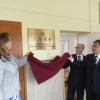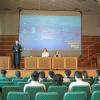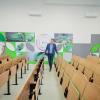SMART HOMES AND TECHNOLOGICAL INNOVATIONS
2024
Apr
22
The Pollack Expo opened its doors between 18th and 19th April, where smart homes and other technological innovations were in the focus of attention. This event is not just a simple fair, but rather a meeting place for industry, academia and the engineering community, where tradition and innovation mix.
The main theme of this year's exhibition is "SMART HOME", which aims to show how a smart building can be achieved through a combination of technological solutions. Smart homes are characterised by the fact that they adapt to lifestyle, are easy on the wallet, take care of valuables, can be controlled from anywhere and are ahead of time. They can even alert you when food is going bad or when guests are arriving.

Photo by Mercédesz Kovács-Csincsák
Smart building automation is a key area of building modernisation, aiming at energy efficiency, user comfort and sustainability. The smart solutions and development directions outlined by Róbert Várföldi, Commercial Manager RSL/INS, Siemens Zrt, provided an in-depth insight into how buildings can be made smarter in the future.
The more we move towards a digitised world, the more we need to digitise as many things around us as possible," - he stressed.
Energy efficiency is one of the most important considerations in the design and operation of smart buildings. Optimising energy use is not only sustainable, but can also lead to significant cost savings. "It is an open and scalable system through which everything can be measured." - Várföldi added. Automated systems used in smart buildings allow intelligent control and optimisation of heating, cooling, lighting and other energy-intensive systems, for example based on environmental data detected by sensors in the building.
Improving user comfort is also a key objective in smart building automation. Smart buildings allow users to easily and conveniently control various building systems and functions using smartphones or other devices. For example, they can remotely adjust the temperature, control lighting or even manage security systems.
The ultimate goal is to integrate the disciplines in the buildings under a single platform." - emphasised Várföldi,
adding that we should be careful not to "confuse" our different smart devices.
From a sustainability perspective, smart buildings offer long-term benefits by reducing energy use and environmental impact. In addition to energy efficiency solutions, the design of smart buildings should also consider the integration of renewable energy sources, such as solar panels or wind energy.

Photo by Mercédesz Kovács-Csincsák
In addition to smart homes, this year's event also featured student developments related to electric vehicles. One example was an electric go-kart built by students of the Faculty of Engineering and Informatics of the University of Pécs.
The Pollack Expo is not only an opportunity to showcase the latest technological innovations, but also offers business and training opportunities. The event supports cooperation between business and higher education and creates opportunities for professional partnerships.
Written by Mercédesz Kovács-Csincsák
- Log in to post comments
University of Pécs | Chancellery | IT Directorate | Portal group - 2020.
















